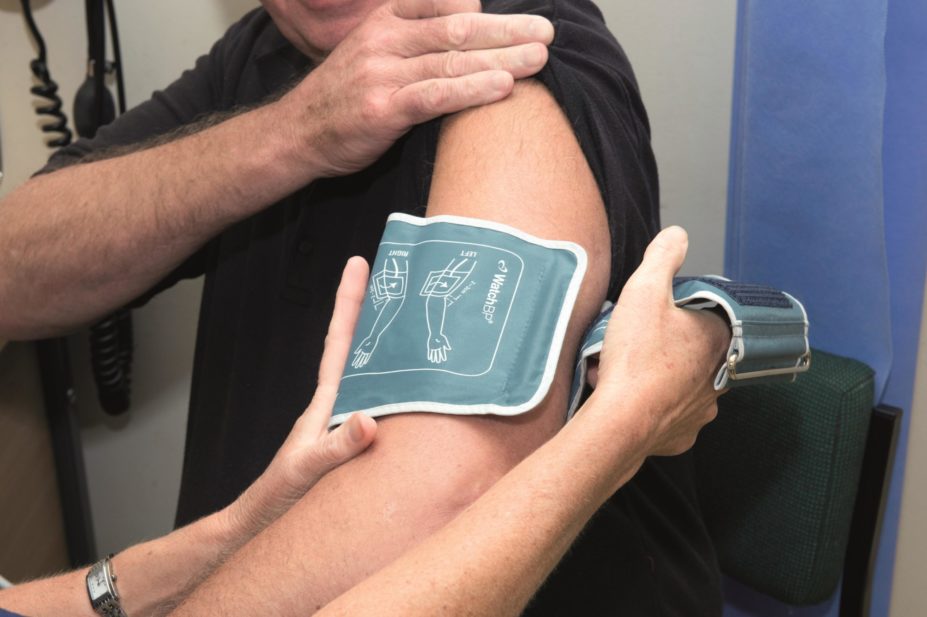
Dr P Marazzi / Science Photo Library
Community pharmacies in England could receive up to £1,800 in incentives to run a service that checks patients for hypertension from October 2021, following the latest round of pharmacy contract negotiations.
The negotations also secured a deal with Health Education England to provide independent prescribing training for community pharmacists.
On 23 August 2021, the Pharmaceutical Services Negotiating Committee (PSNC) announced that it had struck a deal with the Department of Health and Social Care (DHSC) and NHS England and NHS Improvement (NHSE&I) on funding and service provision for the third year of the five-year ‘Community pharmacy contractual framework’.
The five-year contract, which was first announced in July 2019, froze pharmacy funding at £2.592bn per year until 2023/2024.
However, the PSNC said the incentives to run a hypertension case-finding advanced service will come from outside the core funding to help cover the cost of ambulatory blood pressure machines.
The PSNC told The Pharmaceutical Journal that the incentive fees will be paid to community pharmacies based on meeting certain thresholds of activity, with £1,000 paid after providing five ambulatory blood pressure monitoring (ABPM) interventions in 2021/2022.
Some £400 will be paid in 2022/2023 for pharmacies providing 15 ABPM interventions and a further £400 will be paid to pharmacies that provide 20 ABPM interventions in 2023/2024.
As part of the service, which was piloted in pharmacies between 1 November 2020 and 31 July 2021, pharmacists offer ABPM interventions if initial blood pressure readings reveal that a patient has high blood pressure between 135/85mmHg and 180/120mmHg.
The hypertension case-finding advanced service is one of several new services rolling out to community pharmacies.
From September 2021, pharmacies will be able to provide the new medicines service for additional therapeutic areas, including osteoporosis, gout, heart failure, glaucoma and Parkinson’s disease.
And from January 2022, pharmacies will also be able to provide a smoking cessation advanced service, following a pilot that began in November 2020.
The PSNC added that it was also in talks over the “ongoing extension” of the Community Pharmacist Consultation Service (CPCS), particularly on referrals from urgent treatment centres and A&E.
Simon Dukes, chief executive officer of the PSNC, said these referral pathways would be piloted “very soon”.
He added that there were also talks around “seeing what we can do collectively to make the CPCS more effective, particularly in getting referrals from general practice, where, I think we can all accept, numbers have been disappointing”.
In a statement, the PSNC said it had submitted a bid for an increase to the core contract funding but added that there was a “flat rejection” of this from the Treasury.
However, the PSNC said it did negotiate an extension of transitional payments for a further year “so that these critical monies are not lost to contractors”. The transitional payments, which were introduced when the current contract was first negotiated, had been scheduled to end in 2020/2021.
Dukes said: “After a year like no other, contractors should feel aggrieved that HM Treasury flatly rejected any possibility of an increase in the contract sum for this year.
“Throughout the COVID-19 pandemic, community pharmacy has performed magnificently — for patients, the NHS and the country. Not to have that reflected in anything other than warm words is frustrating and supremely disappointing.”
He added that the frozen funding “at £2.592bn for a further year will bring financial tensions as we move through the autumn and the COVID-19 advance repayments start to bite”.
“We continue to press for recognition of the financial pressures that community pharmacy is under and, as the pandemic slowly recedes, underline to government how much worse things could be right now, were it not for the performance of our sector.”
What has been agreed on training and education?
The Pharmaceutical Services Negotiating Committee (PSNC) said in a statement that the contractual agreement for year threeof the five-year ‘Community pharmacy contractual framework’ included commissioning Health Education England (HEE) “to provide a three-year programme of education and training for community pharmacy professionals, including independent prescribing training for existing pharmacists”.
This comes after Keith Ridge, chief pharmaceutical officer for England, told attendees of the NHS Confederation Conference that NHS England was “identifying funding” to provide community pharmacists with independent prescriber training.
In addition, from 2022/2023, HEE will support the management of training places in community pharmacy and take on the responsibility for administration of payments to community pharmacy contractors for trainee pharmacists.
The PSNC said it “is seeking greater clarity on the proposed changes and is continuing to work with the community pharmacy trade bodies, who lead the sector’s work on workforce matters”.
READ MORE: Government impact assessment of pharmacy contract warned it could cause closures


